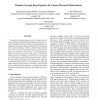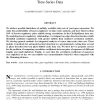130
click to vote
SAC
2009
ACM
15 years 9 months ago
2009
ACM
Incorporating background knowledge into data mining algorithms is an important but challenging problem. Current approaches in semi-supervised learning require explicit knowledge p...
101
click to vote
CBMS
2009
IEEE
15 years 9 months ago
2009
IEEE
Biomedical scientists generate, access, validate and interpret multiple distributed and heterogeneous data sets. Semantic annotations for these data sets are paramount for exchang...
127
click to vote
BIBM
2009
IEEE
15 years 9 months ago
2009
IEEE
A major challenge in microarray classification and biomarker discovery is dealing with small-sample high-dimensional data where the number of genes used as features is typically o...
EDBT
2010
ACM
15 years 9 months ago
2010
ACM
We study the performance issue of the “iterative” record linkage (RL) problem, where match and merge operations may occur together in iterations until convergence emerges. We ...
130
click to vote
ICDE
2010
IEEE
15 years 9 months ago
2010
IEEE
— The size of data sets being collected and analyzed in the industry for business intelligence is growing rapidly, making traditional warehousing solutions prohibitively expensiv...
142
click to vote
WWW
2010
ACM
15 years 9 months ago
2010
ACM
Researchers increasingly use electronic communication data to construct and study large social networks, effectively inferring unobserved ties (e.g. i is connected to j) from obs...
102
click to vote
CVPR
2010
IEEE
15 years 10 months ago
2010
IEEE
We present an algorithm that learns invariant features from real data in an entirely unsupervised fashion. The principal benefit of our method is that it can be applied without hu...
RECOMB
2001
Springer
16 years 2 months ago
2001
Springer
We address possible limitations of publicly available data sets of yeast gene expression. We study the predictability of known regulators via time-series analysis, and show that l...
139
click to vote
KDD
2009
ACM
16 years 2 months ago
2009
ACM
The discovery of biclusters, which denote groups of items that show coherent values across a subset of all the transactions in a data set, is an important type of analysis perform...
157
click to vote
ICML
2000
IEEE
16 years 3 months ago
2000
IEEE
This paper has no novel learning or statistics: it is concerned with making a wide class of preexisting statistics and learning algorithms computationally tractable when faced wit...



